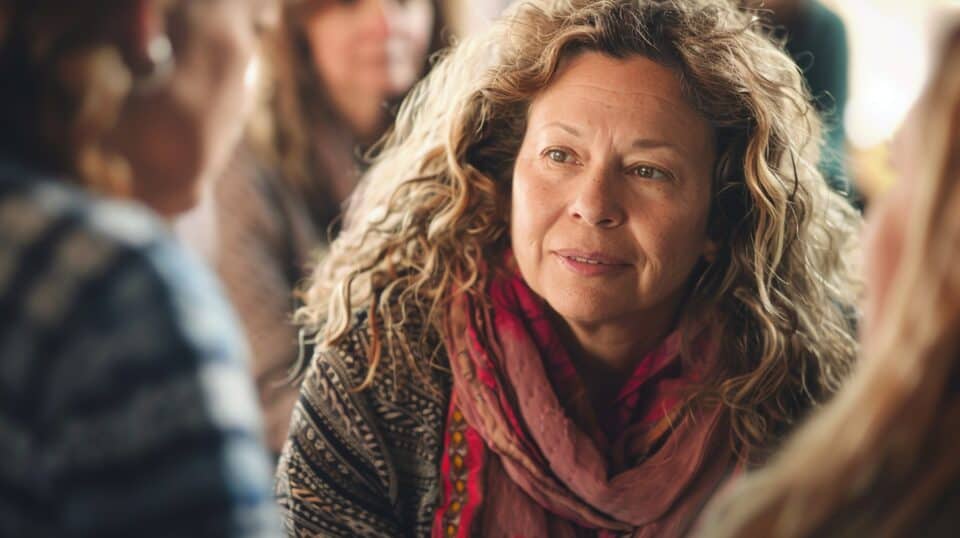Dealing with a drug-addicted husband challenges many marriages. SAMHSA’s National Helpline received 833,598 calls in 2020. This blog outlines 8 key steps to tackle addiction and recovery together, ensuring clarity and support.
Keep reading for guidance…
Key Takeaways
Talk to your husband about his addiction kindly and plan how to tackle it together. This includes finding the right treatment, like rehab or counseling.
Build a strong support network for yourself, too. Join groups, talk to friends, and maybe get a therapist. You need care as well.
Consider all options before thinking about divorce. Try interventions, therapy, and other ways to help first.
Use SAMHSA’s National Helpline if you need advice or resources for dealing with drug addiction in your family. They can guide you to the right help.
Take care of your health by exercising and eating well. Stress from dealing with an addicted partner is hard; looking after yourself helps you stay strong.
Table of Contents
The Nature of Addiction in Marriage

Addiction in marriage is like a storm that shakes the foundation of your life together. It turns trust, love, and joy into battles over drug use, lies, and pain. For help, many turn to places like Malibu drug treatment center for a path back to health.
What is Addiction for Spouses and Partners
Addiction turns a partner into someone they’re not. It’s like living with a stranger who lies, hides things, and may even steal to feed their habit. My husband was once caring but became distant and angry due to his drug use.
About 24.6 million marriages face this challenge, where one spouse battles addiction, causing pain for both.
Addiction is the thief of love and trust in a marriage.
Dealing with an addicted spouse means constant worry about their health, safety, and whether they will find recovery. It also brings financial strain as money disappears into drugs instead of household needs.
Trust fades when lies become common. Love gets tested every day.
Signs of Addiction: Behavioral, Physical, and Financial Indicators
Spotting signs of addiction in your husband involves close observation. You’ll notice changes that seem out of the ordinary.
- Secrecy spikes. He hides his phone and keeps outings under wraps.
- Mood swings grow common. One moment he’s fine, the next, he’s angry or sad.
- Social circles shift quickly. Old friends fade away; new, unfamiliar ones appear.
- Money problems emerge. Savings dwindle or he borrows money without good reason.
- Work issues arise. He might start missing days or complain more about his job.
- Health takes a hit. Look for unusual tiredness, weight loss, or neglected hygiene.
- Interests change fast. Things he loved before don’t matter much now.
- Fights increase over small stuff, making peace hard to keep at home.
From my own journey, I recall how these signs crept into our life quietly but grew loud over time—missing funds for no clear reason was our first major clue. We faced sudden secrecy and mood changes that flipped our world upside down.
Direct actions clarify paths forward:
- Pay attention to how much money goes missing.
- Note any sharp shifts in behavior or appearance; these often signal deeper issues.
- Keep track of friends who come and go suddenly; they can influence bad habits.
Understanding these signs is crucial for starting recovery steps together with certainty and precision, guiding every action towards healing both as individuals and as a couple.
Impacts of Drug or Alcohol Addiction on Marital Relationships

Drug or alcohol addiction hits marriages hard. Trust breaks, money problems grow, and fights get loud – love faces tough tests.
Dealing with Trust Issues
Trust is hard to rebuild once it’s broken, especially when your husband hides his substance use. Over 30,500 young children were exposed to addictive substances in 2016, showing how common deception can be in families dealing with addiction.
This fact alone highlights the urgent need for openness and honesty between spouses.
Trust must be rebuilt step by step.
To handle trust issues, start with open conversations about feelings and fears. Use therapy sessions as a safe space where both of you can express concerns without judgment. Family therapy often helps couples work through mistrust and build a stronger foundation for recovery.
Make honesty a priority in every talk and action taken towards healing together.
Navigating a Financial Crisis
After dealing with trust issues, it’s vital to face money problems head-on. Addiction often drains finances due to spending on substance use or losing jobs. The first step is creating a budget that cuts non-essential expenses and finds ways to decrease debts.
This might involve talking to financial advisers or counselors who specialize in addiction recovery.
Next, explore all options for income support and resources available for families facing addiction. This includes looking into social services, community programs, or temporary assistance for needy families.
Keep track of every dollar spent and earned – this clarity can prevent further financial strain. Over time, consistent effort leads to stability, ensuring you can manage future challenges without adding debt or stress.
Managing Arguments and Volatile Fights
Arguments and fights often grow with addiction issues. More than 7% of divorces happen because people abuse drugs or alcohol. This shows how serious fights can get in marriage when one partner uses substances too much.
It’s clear that solving these arguments needs smart steps.
Calm talks are key during calm moments. These chats should focus on feelings, not blame. Say things like, “I feel worried when you drink a lot,” instead of accusing. Setting boundaries is also important.
For example, agreeing no substance use at home helps reduce tensions. Next, let’s look into how intimacy gets affected in these situations.
Addressing Intimacy Issues
Drug and alcohol addiction harms sexual desire and performance, hitting marriage hard. My own journey taught me, as the emotional gap widens, intimacy suffers more. Facing these troubles head-on is the only way through.
Intimacy issues can feel like a lonely battle in the shadow of addiction.
Cognitive Behavioral Therapy (CBT) offers tools for rebuilding connections damaged by substance abuse. Together with counseling focused on sexual well-being, couples find paths to regain lost closeness.
Each session brings hope, one step at a time. Clear communication about needs and desires opens doors to healing damaged bonds.
With patience and support from healthcare providers specializing in addiction medicine and sexual medicine, recovery becomes possible. It’s crucial to remember that each small victory counts on this road back to each other.
Coping with Chronic Stress and Fear
Living with chronic stress and fear due to a spouse’s addiction wears you down. It feels like carrying a heavy load every day. Focus on building your mental health by finding routines that bring peace, like meditation or walking.
Seek help from SAMHSA’s National Helpline for guidance and support in managing stress related to your husband’s addiction.
Join support groups where you can share experiences and coping strategies with those who understand best—other wives dealing with the same issues. This helps reduce feelings of being alone in your struggle.
Taking these steps seriously improves not just your well-being but also prepares you for any challenges ahead.
Recognizing Codependency and Enabling

Codependency and enabling harm recovery. If you find yourself lying to cover up his drug use or paying off debts, these are signs of enabling. This stops him from facing the consequences of his addiction.
Recognize codependent behaviors like feeling responsible for his drug use or putting his needs before your own health. This can make the addiction worse.
Facing these patterns is hard, but necessary for change. Next, learn how to talk about addiction with your husband without blame or anger.
Strategies for Discussing Addiction with Your Husband

Talking about addiction with your husband needs a clear plan… Start with honesty, choose the right moment. Use simple words to keep stress low. Show love, not blame.
How to Confront the Problem
Talk to your husband about his addiction using clear, kind words. SAMHSA says this helps prevent him from getting defensive. Choose a calm time for this talk, and be honest about your feelings and worries.
Avoid blaming him; focus on how his drug abuse affects you and the family.
Plan what to say before the conversation. Write down specific examples of when his addiction caused problems, like missing work or arguing at home. This makes your concerns real and hard to ignore.
Show support by suggesting you look into treatment options together, such as therapy or rehab programs that focus on substance misuse and mental health counseling.
Planning Next Steps Together
Planning next steps with your husband involves clear actions and strong support. It means setting a positive path for recovery, one step at a time.
- Schedule an open talk about addiction treatment options. Research shows that expressing support can lead to successful planning for recovery.
- Review SAMHSA’s resources together. This ensures you both understand the types of treatments and support groups available.
- Arrange a meeting with an addiction counselor. Getting professional guidance helps in making informed decisions.
- Decide on the most suitable type of rehab or treatment option. Choices can range from inpatient facilities to outpatient programs.
- Establish a timeline for starting treatment. Deadlines create urgency and demonstrate commitment.
- Create a list of goals to achieve during and after treatment. Aim for both short-term and long-term objectives, like staying sober for 30 days or finding employment within six months post-recovery.
- Prepare a budget plan considering the cost of treatment and other financial needs during this period. Financial planning reduces stress and focuses on recovery.
- Compile contact information for immediate support, including hotlines, therapists, and supportive friends or family members.
Using these strategies, my journey with my husband toward his recovery was more organized and less overwhelming than we feared it could be––confirming that taking definitive actions together fosters hope and progress in battling addiction.
Aiding Your Husband’s Journey to Recovery

Help your husband fight addiction. Stand by him, in interventions and rehab, showing love and support.
The Role of an Intervention
An intervention is a planned meeting. It helps your husband see his drug problem clearly. Family, friends, and an interventionist join in. They share how his addiction hurts them. This makes him understand he needs help.
SAMHSA gives steps for a successful intervention. You learn to speak kindly but firmly. The goal is to guide him towards treatment options like rehab or counseling for substance abuse and mental health issues.
It’s a crucial step in starting recovery together.
Support During Treatment
After deciding on an intervention, providing support during treatment becomes essential. It’s a tough journey, filled with ups and downs. SAMHSA highlights the value of family involvement in recovery programs—this includes emotional backing and taking part in therapy sessions.
From attending group meetings to listening without judgment, your role is crucial. As someone who has stood by their partner through addiction treatment, I learned firsthand the importance of being there—for every appointment, every call, and every setback.
Continuous support can turn recovery from a possibility into a reality.
Treatment requires more than just showing up; it demands active participation. Encourage discussions about feelings and progress. Offer to drive to appointments or find resources together like addiction counseling or substance abuse treatment options.
Remembering details helps too; note any changes in behavior that might signal a problem or improvement. Your involvement shows care and reinforces the commitment to getting better together.
Encouraging Rehab and Treatment Options
Finding the right rehab for your husband is key. Different options fit different needs. Here’s how you do it:
- Talk with your husband about rehab openly. Listen to his feelings and fears.
- Use SAMHSA’s National Helpline for guidance. They list many treatment places across the U.S.
- Visit a few rehab centers together, if possible. See which one feels right.
- Consider the type of treatment he needs: medical detox, therapy sessions, or a mix of both.
- Check if your insurance covers the cost of treatments. Many times, they do.
- Ask about follow – up care after leaving the center to keep him on track.
- Encourage him to meet others who have beaten their addiction, for motivation.
Next up, let’s talk about building a support network for yourself…
Self-Care While Supporting Your Husband

Taking care of yourself is key while you help your husband. Find time for hobbies and friends that make you happy. Join groups with people facing similar challenges for support. Keep stress low by practicing relaxation techniques like deep breathing or yoga.
Stay healthy with regular exercise and good food choices. Remember, it’s okay to ask for professional help when you need it too, whether from therapists or wellness coaches. So, take the first step today towards a healthier you.
Building a Support Network
Building a support network is essential. It keeps you strong and focused. You need people who understand your struggle. Friends, family members, or groups like SAMHSA can help. They offer guidance when things are tough.
Joining support groups for families of addicts creates a space where you’re not alone.
Experts say sharing experiences with others in similar situations brings relief and hope. Imagine always having someone to call when fear strikes, or celebrating small wins together.
Such bonds make the journey less heavy.
Surround yourself with those who understand your journey – it can change everything.
Handling Stress and Fear
After linking with others for support, focusing on handling your own stress and fear is the next step. Learning to manage these feelings is key. SAMHSA highlights ways to ease anxiety without burning out.
I can say from experience that small actions make a big difference. For example, taking deep breaths or going for short walks helped me calm down.
Setting aside time for yourself every day is critical. This could be reading a book, practicing yoga, or any hobby you enjoy. Such activities offer a break from worry and refresh your mind.
You must take care of yourself to stay strong for both of you.
Deciding on Divorce: When and How

Deciding on divorce is tough. It means accepting that the marriage can’t withstand addiction struggles. Here’s how to approach it:
- Reflect deeply on your relationship’s path. Think about the good times and the challenges. This helps you see clearly if recovery together is possible.
- Talk to a therapist alone first. They offer insight without judgment, helping you sort through feelings.
- Seek legal advice early. Understand your rights and what divorce involves—like division of assets and custody issues if kids are involved.
- Prepare for hard conversations with your husband. Plan what to say ahead of time to stay calm and clear.
- Explore all other options before deciding. Make sure divorce is truly the last resort after trying therapy, interventions, or rehab together.
- Consider timing carefully for stability—especially if kids are in the picture.
- Document instances where addiction impacted safety or finances negatively, if needed for legal reasons.
- Build a support network who understands your decision regardless of outcome; friends, family, counselors can be lifelines during this process.
- Set boundaries post-decision to protect emotional well-being for both of you during separation proceedings.
- Stay focused on personal healing and growth beyond the divorce to rebuild a positive future.
These steps guide through the difficult decision with intention and care for all involved.
Seeking External Assistance and Resources

Getting help is key. You can call SAMHSA’s National Helpline or talk to a counselor for guidance.
Utilizing SAMHSA’s National Helpline
SAMHSA’s National Helpline is a free, confidential service available 24/7. It offers treatment referral and information for people facing substance use disorders. In 2020, the helpline received 833,598 calls, showing many rely on it for aid.
You can call this helpline any time you need help with drug addiction problems in your family. This service will connect you to resources and support systems without cost or judgment.
It’s a solid first step towards recovery for your husband and getting the guidance you both might be searching for.
Seeking Addiction Counseling
Finding the right addiction counselor is a concrete step toward recovery. You can use SAMHSA’s directory to locate health services that fit your husband’s needs. Personal stories tell us this choice makes a big difference.
It’s not just about talking; it’s about finding someone who understands drug abuse, mental illness, and how to help someone fight their cravings. This person will guide both of you through detoxification and offer support for staying sober.
You must choose professionals experienced in dealing with substance abuse programs, dialectical behavior therapy (DBT), and clinical mental health counseling. These experts provide strategies that tackle withdrawal symptoms, manage low self-esteem issues linked with alcoholism, and mend the behavioral health damage.
Their knowledge ensures your husband gets comprehensive care tailored specifically for his journey to sobriety, while also safeguarding your well-being throughout this process.
Exploring Medical Detox Services
Medical detox is a key first step to help your husband safely stop using drugs. It handles withdrawal symptoms under medical care. SAMHSA can guide you to these services, ensuring safety and comfort.
This process often takes place in hospitals or specialized clinics, where health care providers can watch over patients closely.
I once helped a friend find a detox center for her spouse. We looked at several places before choosing one that fit their needs best – it had experienced medical officers and offered support for both the patient and family members.
Detox length varies, but expect it to last from a few days up to a week depending on the substance used.
FAQs About How to Deal with a Drug Addict Husband
What should I do if my husband is addicted to drugs?
First, understand it’s a disease. Encourage him to seek addiction rehabilitation or medical help from board-certified doctors. Be there, but don’t enable his drug use.
How can I talk to my husband about his drug addiction without causing a fight?
Choose a calm moment. Express concern without blame… Use “I feel” statements rather than accusations. Offer help and support for recovery together.
Can drug addiction lead to other problems in our marriage?
Yes, sadly. Drug abuse often brings domestic violence, depression, sexual dysfunction, and even co-dependent relationships into the mix.
Is it okay to ask for help if my husband’s addiction affects me too?
Absolutely! Seek out therapy or support groups for yourself—mental well-being matters for both of you in this journey.
What if he refuses help with his addiction?
Tough situation… You may need professional advice on setting boundaries—safety first always! Consider intervention as an option, but proceed with caution and guidance.
How can we rebuild trust after rehab?
Start slow; focus on sober living steps together… Celebrate small victories and be patient—it’s a long road but worth walking side by side.



